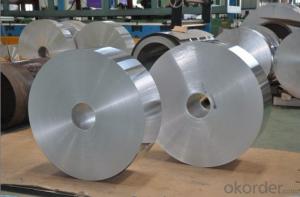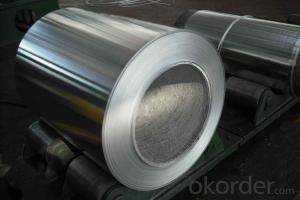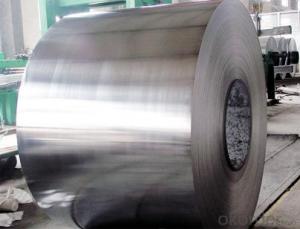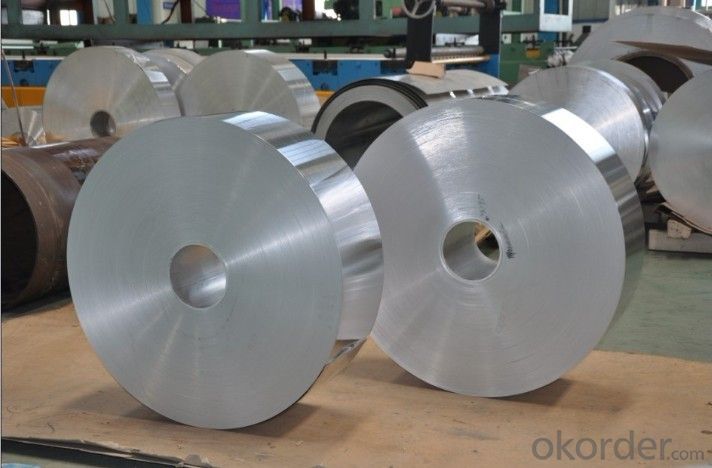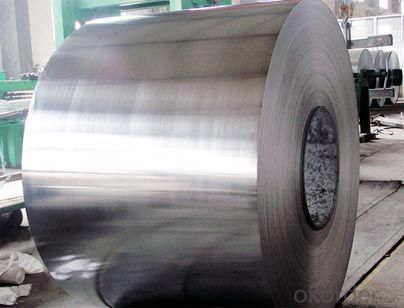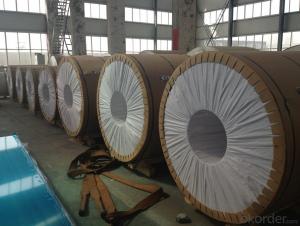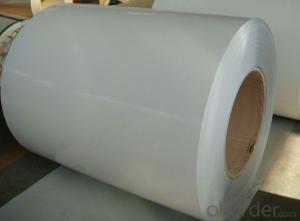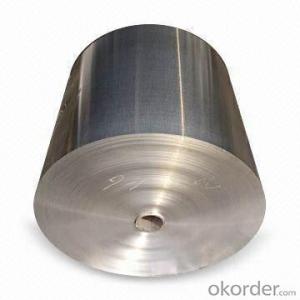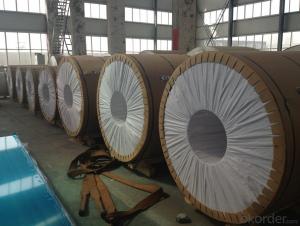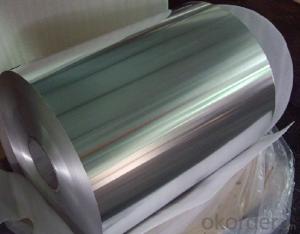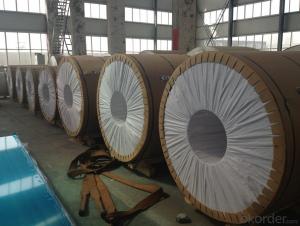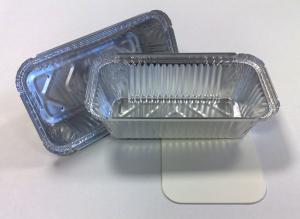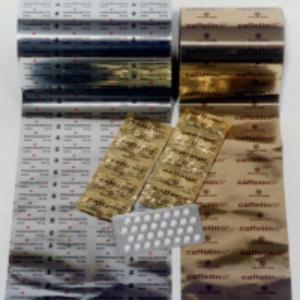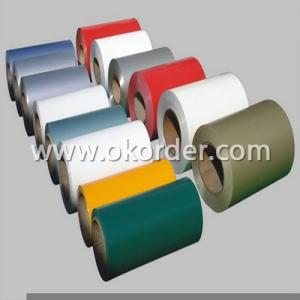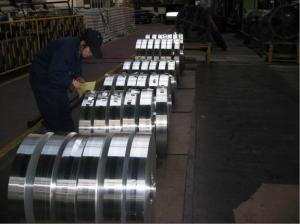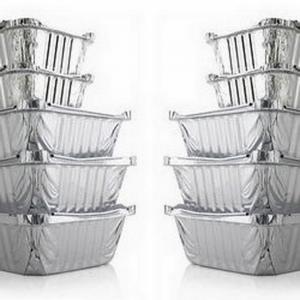Aluminum Cold Rolled Coil Thick Foil from China
- Loading Port:
- Shanghai
- Payment Terms:
- TT OR LC
- Min Order Qty:
- 5 m.t.
- Supply Capability:
- 100000 m.t./month
OKorder Service Pledge
OKorder Financial Service
You Might Also Like
Specification
Product Description
Commodity: Aluminum coil jumbo rolls
Alloy: 1050/1060/1100/1200/3003/3004/3005/3105/5005/5052/5754/5083/6061/8011
Temper: O, H12,H14,H16,H18,H22,H24,H32,H112,T6
Gauge: 0.2mm-8mm
CC and DC material with higher tensile strength and bigger elongation
Company Information
CNBM is in aluminum foil, coil, sheet, plate for more than 10 years, thus we have rich product, technology and market experiences. With the world’s top aluminum processing equipments, experienced technical staff, cooperative and professional sales team, and the enterprise concept of responsibility and sharing, we have been widely focused since the day set up, and has gained high praise from customers home and abroad until now.
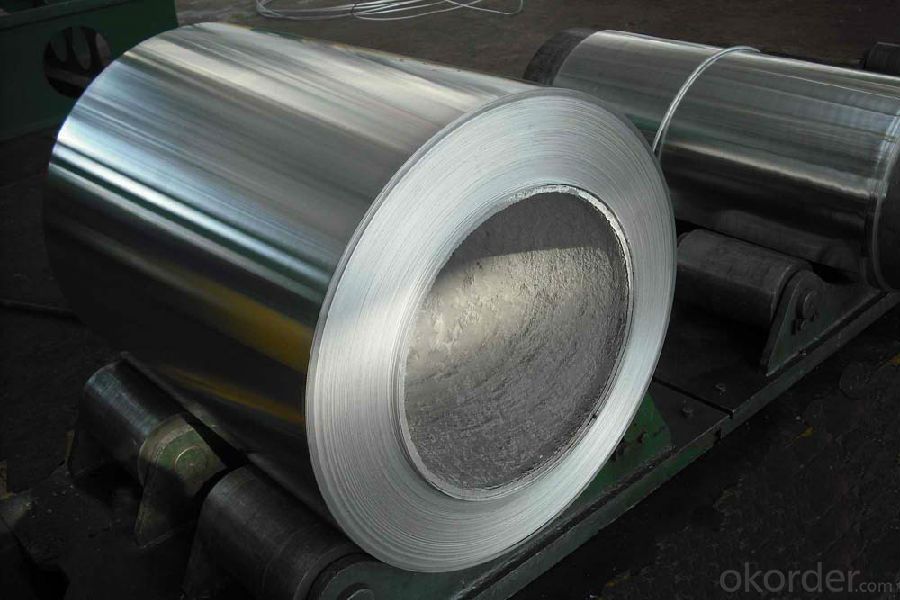
We specially produce and sell all kinds of aluminum foil, coil, sheet and plate with different sizes and applications. For Foil product, the main gauge ranged from 0.006mic to 0.10mm, and width ranged from 200mm to 2000mm. Alloys are 1235/ 1050/1060/1200/8079/8011/8006 etc, and ID is 76mm, 152mm. The main application includes flexible package, cigarette foil, golden card foil, pharmaceutical foil, household foil, container foil, air conditioner foil, lid foil, beer mark foil etc. We also can supply aluminum coil, strip, sheet and plate in alloy of 1000 series, 3000 series, 5000 series, 6000 series and 8000 series etc.
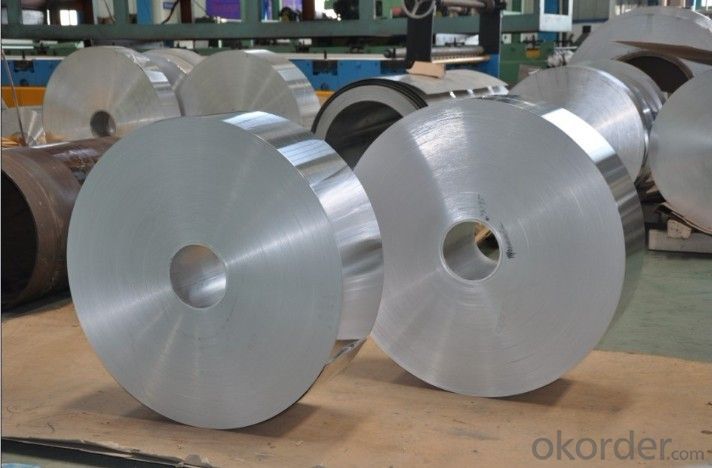
CNBM has passed ISO9001 and ISO14001 successfully, and also approved by American Food and Drug Administration (FDA). By the good product quality and professional service, we have set up a complete sales network. Until now, our products has exported to more than 20 countries and regions including Europe, USA, Canada, Brazil, Southeast Asia and middle east etc.
Our main products for aluminum coils are as follows:
Commodity | Alloy | Temper | Thickness /mm | Width /mm | |
Base material | 1235 1200 1140 8*** | H14 H18 | 0.25-1.00 | 950-1340 | |
Coil for PS | 1050 1060 | H18 | ≥0.2 | 830/920 1030/1050 | |
Sheets for PS | 1050 1060 1070 | H18 | 0.13-0.3 | 650-1300 | |
Strip for venetian blinds | 5052 | H19 | 0.13-0.3 | 300-1300 | |
Coils for composite panels | 1100 3003 3005 | H18/HX2 HX4/HX6 HX8 | 0.03-1.0 | 1000-1300 | |
Coils for other uses | 1100 1235 3004 5052 8011 | H14 H18 H24 O | 0.3-0.4 | 1000-1600 | |
Sheets/Strips for other uses | 5052 | O/H32/H34 | 0.07-2.0 | 950-1550 | |
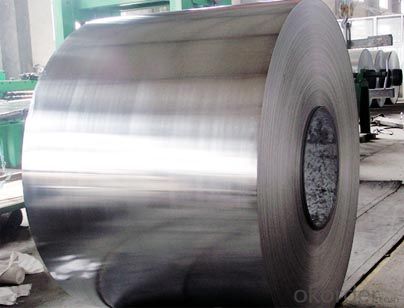
- Q: This question asks about the chemical reaction between aluminum and water.
- <p>Aluminum does not react with water under normal conditions. However, when aluminum is heated, it can react with steam to form aluminum oxide and hydrogen gas. The reaction is exothermic and can be represented by the following equation: 2Al + 3H2O 鈫?Al2O3 + 3H2. This reaction is utilized in some industrial processes, but it is not a common occurrence in everyday settings. At room temperature, aluminum is protected by a thin layer of aluminum oxide that forms on its surface, which prevents further reaction with water.</p>
- Q: What are the various applications of aluminum oxide in different industries and daily life?
- <p>Aluminum oxide, also known as alumina, has a wide range of applications due to its hardness and other properties. It is used as an abrasive in products like sandpaper and grinding wheels. In the electronics industry, it serves as a substrate for semiconductor devices. It's also a key component in the production of aluminum metal through the Hall-H茅roult process. In the medical field, aluminum oxide is used in dental materials and as an antiperspirant. Additionally, it's found in cosmetics, ceramics, and as a catalyst in various chemical processes.</p>
- Q: Explain the distinction between pure aluminum and aluminum alloys, focusing on their composition and properties.
- <p>Pure aluminum is composed of aluminum alone, with a high degree of purity, typically over 99%. It is soft, malleable, and has good thermal and electrical conductivity. Aluminum alloys, on the other hand, are made by combining aluminum with other elements such as copper, magnesium, or silicon to enhance their strength, durability, and resistance to corrosion. These alloys are harder than pure aluminum and can be tailored for specific applications, making them more versatile for industrial use.</p>
- Q: Explain how the use of aluminum contributes to global warming in a few sentences.
- <p>The use of aluminum significantly affects global warming due to the energy-intensive process required to extract it from bauxite ore. The production of aluminum releases large amounts of greenhouse gases, particularly carbon dioxide, which contribute to global warming. Additionally, the electricity used in aluminum production often comes from fossil fuels, further exacerbating the issue. Moreover, aluminum is lightweight and durable, leading to increased demand, which in turn drives up production and emissions. The recycling of aluminum is crucial to mitigate its environmental impact, as it requires only 5% of the energy needed for primary production, significantly reducing carbon emissions.</p>
- Q: Is it possible to utilize aluminum in the construction of automobiles?
- <p>Yes, aluminum is widely used in automobiles due to its lightweight and high strength properties. It is commonly found in engine components, body panels, and wheels. Aluminum helps reduce the overall weight of the vehicle, which can improve fuel efficiency and reduce emissions. Additionally, it is resistant to corrosion and can be easily recycled, making it an environmentally friendly choice.</p>
- Q: What other materials can be used for food packaging besides aluminum?
- <p>Alternative materials to aluminum for food packaging include biodegradable plastics such as PLA (Polylactic Acid), paper-based materials, glass, and stainless steel. Biodegradable plastics are derived from renewable resources and break down over time. Paper-based materials are sustainable and can be recycled. Glass is a non-porous material that is excellent for preserving food quality and is also recyclable. Stainless steel is durable, reusable, and does not react with food, making it a popular choice for reusable containers. Each material has its own set of advantages and disadvantages, and the choice depends on factors like food type, shelf life, and environmental impact.</p>
- Q: What are the potential dangers of utilizing high-purity aluminum powders in industrial settings?
- <p>Yes, there are risks associated with using high-purity aluminum powders in manufacturing processes. These powders can be highly reactive, especially when in fine particle form, and pose a risk of dust explosions if they come into contact with an ignition source. Additionally, aluminum dust can be a respiratory hazard, potentially causing health issues if inhaled. Proper handling, storage, and safety measures are crucial to mitigate these risks.</p>
- Q: This question asks about the methods to guarantee that the aluminum content in products is within safe limits.
- <p>To ensure that products do not contain excessive amounts of aluminum, implement a strict quality control process. This includes sourcing raw materials from suppliers who adhere to strict aluminum content limits, conducting regular testing of products using advanced analytical techniques such as Inductively Coupled Plasma Mass Spectrometry (ICP-MS) or Atomic Absorption Spectroscopy (AAS). Establishing and following Good Manufacturing Practices (GMP) is crucial, along with continuous monitoring and improvement of production processes. Additionally, staying updated with regulatory guidelines and setting internal limits that are below the legal maximum levels can help maintain safety and compliance.</p>
- Q: Is it possible to develop allergies from exposure to aluminum found in food packaging materials?
- <p>While aluminum is commonly used in food packaging materials, the risk of allergic reactions to aluminum is generally low for most people. Aluminum is not a known allergen, and exposure through packaging is typically minimal. However, individuals with a rare condition called contact dermatitis may experience skin irritation from aluminum. For the general population, the risk of allergic reactions due to aluminum in food packaging is negligible. It's always important to monitor any unusual reactions and consult a healthcare professional if concerned.</p>
- Q: Is aluminum a suitable material for constructing aerospace structures?
- <p>Yes, aluminum is widely used in aerospace structures due to its high strength-to-weight ratio, corrosion resistance, and ease of fabrication. It is particularly favored for aircraft frames, wings, and fuselage components. Aluminum alloys are also used in spacecraft and satellite structures for their lightweight properties and ability to withstand extreme temperatures.</p>
Send your message to us
Aluminum Cold Rolled Coil Thick Foil from China
- Loading Port:
- Shanghai
- Payment Terms:
- TT OR LC
- Min Order Qty:
- 5 m.t.
- Supply Capability:
- 100000 m.t./month
OKorder Service Pledge
OKorder Financial Service
Similar products
Hot products
Hot Searches
Related keywords
